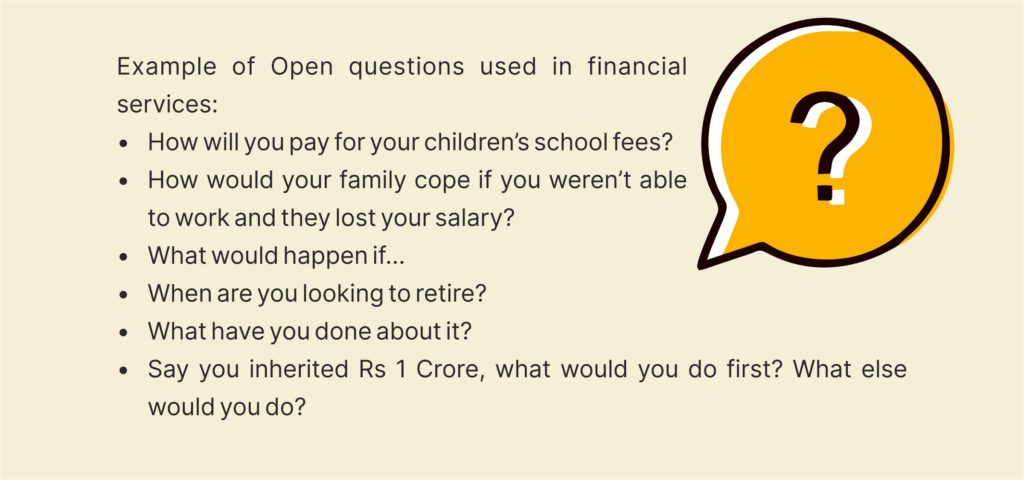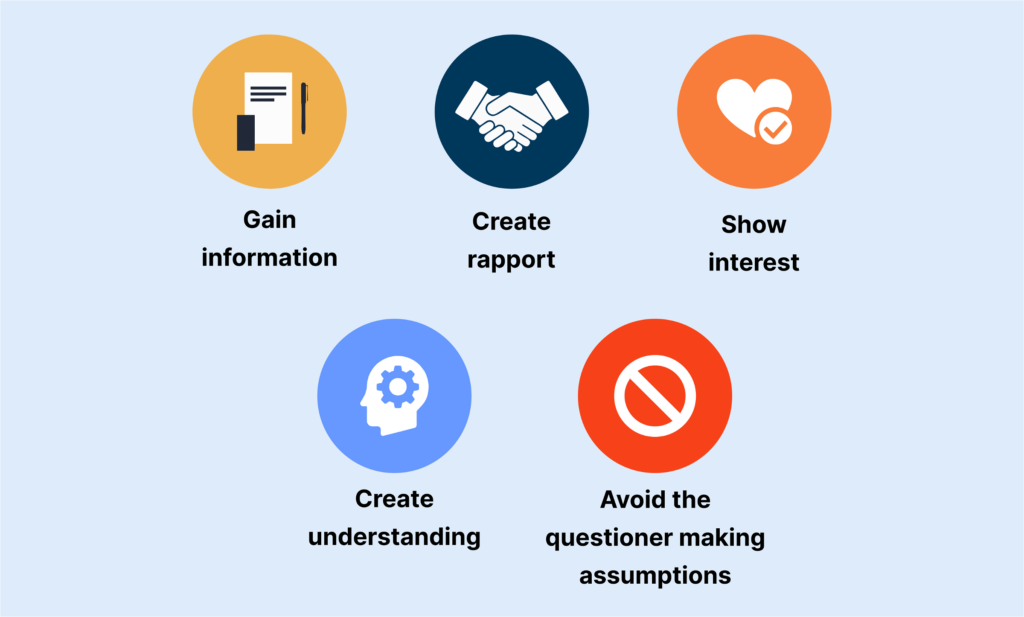Effective Questioning in Insurance sales
To be able to provide a solution to your customer, it is essential as an advisor to first identify the problem at hand. This requires effective questioning skills, which are crucial to successful selling. By asking good questions, you can discover the customer’s actual needs and desires. The questions that you frame will aid you in uncovering the customer’s needs and desires, as well as connecting with them and showcasing your knowledge.
Let us now take a closer look at the various types of questions that successful salespeople use to achieve this goal.
- Closed Questions
- Open Questions
- Probing Questions
- Hypothetical Questions
- Reflective Questions
- Pause. (Although a ‘pause’ is not actually a question, it is a powerful tool when used with questions as we will see.)
1. Closed Questions – Effective Questioning
Closed questions are an essential component of effective questioning, as they enable you to obtain straightforward and direct answers with a simple “yes” or “no” response. These questions serve the purpose of verifying and clarifying information to confirm that you have fully comprehended what the customer has conveyed.
Closed questions also play a crucial role in closing a sale or obtaining customer commitment. For instance, questions like “Do you want to pay monthly or annually?” or “Will you require immediate cover?” can assist in persuading customers to make a purchase.
However, one significant drawback of using Closed questions is that they do not allow the customer to express their viewpoint or the complete story. Over-reliance on Closed questions can also lead to the customers feeling as though they are being interrogated, which can negatively impact their willingness to engage with the salesperson.
If a salesperson exclusively relies on Closed questions, it can be time-consuming to obtain a complete understanding of the customer’s needs and requirements, if they can do it at all. Therefore, it is essential to use a blend of different types of questions to foster customer engagement, and closed questions should be used judiciously.
2. Open Questions – Effective Questioning
Open questions open up discussions and encourage people to express their thoughts, feelings, opinions, and values. These questions seek information and often begin with words such as “what?” and “when?” However, one should use “why” with caution because it can come off as confrontational.
The drawback of using open questions is that they can be time-consuming as they require the customer to provide more information to answer fully. In contrast to closed questions, which only require a simple “yes” or “no” response, open questions allow the customer to express themselves fully. However, this can also be a disadvantage as it can lead to longer conversations and take up more time.
Therefore, it is important to use open questions strategically and at appropriate times during a conversation with a customer. Open questions can help build trust and rapport with the customer by showing a genuine interest in their needs and concerns.
Why not? Why?
We just discussed how Open Questions help in knowing the ‘why’ behind a decision. ‘Why’ is an Open question and a very effective one, but it should be used with care because it can imply criticism. It can sound accusative or judgemental even though we do not mean it to.

These questions highlight your customer’s needs by getting the customer to give detailed, specific answers. They cannot answer them with a “yes” or “no.”
3. Probing Questions – Effective Questioning
Probing questions are used to follow Open questions.
- They encourage people to give more information so that you can understand their situation in detail and get them to paint a more vivid picture of their needs and desires. Probing questions are normally Open questions.
Examples of Probing questions are:
“What happened next?” and “Exactly how will you achieve this?” “What have you done about it?” One of the example questions is a Probing question that would be asked to follow up any number of Open questions covering topics such as retiring, protecting family, etc.
Although it is a statement, “Tell me more,” is a really good Probing tool. Make sure when you use this, you do make a statement and not ask the question, “Can you tell me more?” To which they can easily answer, “No.”
4. Hypothetical Questions – Effective Questioning
Hypothetical questions are very good for finding out the customer’s desires and aspirations.
- They can also be used to test how important an uncovered need is to the customer.
“Say you inherited Rs 1 Crore, what would you do first?” is an example of a Hypothetical question.
5. Reflective Questions – Effective Questioning
Reflective questions are asked to confirm your understanding of what the customer has told you. A Reflective question usually is a Closed question that summarises what has been said.
“Would I be correct in saying…” and “What you are saying is…” are examples of Reflective Questions.
Pause
The final tool that we look at under questioning isn’t a type of question, it is the ‘Pause’.
A very powerful way of getting someone to talk is to be quiet.
Most people feel uncomfortable with silence, so use pauses to keep the customer talking. If there is silence a customer will often fill it.
Because people are uncomfortable with silence, it is important that you adopt open, non-threatening Body Language when using the Pause. Having asked the customer an Open or Probing question – wait for a response!
As well as encouraging the customer to talk, a Pause gives you, and your customer a much-needed opportunity to think and take in what is being said.
Pointers to remember
Questions are very useful to us, but they must be handled carefully because overuse or misuse can look offensive. As with Closed questions, too many Open questions in quick succession may sound as though you are interrogating the customer, which may make him bored or irritable.
Asking the right question will, if correctly constructed:

So choose the questions carefully and always acknowledge the reply, don’t just carry on with your next question and most importantly, don’t forget to listen to the reply. It doesn’t matter how good your questions are if you aren’t listening to the answers.
